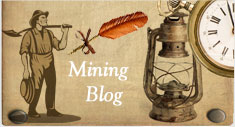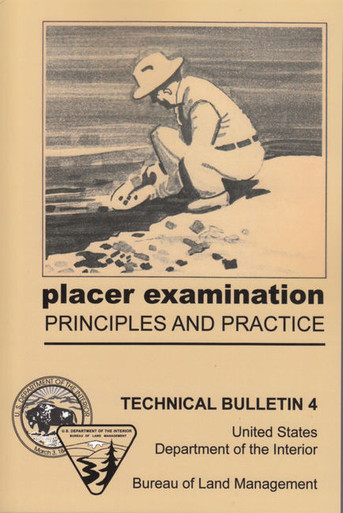Categories
Categories
- $1 Items
- Digitally Archived Documents
- Downloadable Maps
- DVD's and Video's
- Geology and Ore Deposits
- History
- Jewelry Gems Lapidary
- Lode Mining
- Metal Detecting
- Mineral Processing & Metallurgy
- Mining & Geology
- New
- No Category
- Placer Mining
- Prospecting and Exploration
- Publications by Country
- Publications By State
- Rare and Out of Print
- Treasure Hunting
- Home
- Prospecting and Exploration
- Placer Examination Principles and Practice Technical Bulletin 4 BLM Book
Placer Examination Principles and Practice Technical Bulletin 4 BLM Book
Product Description
Placer Examination
Principles and Practice
Technical Bulletin 4 - Bureau of Land Management
This book originally published by the Bureau of Land Management is a great resource for information on Placer Deposit formation, types of deposits, prospecting for deposits, running tests to determine viability of mining such deposits, types of equipment and more. Long out of print this book has now been put back in print by miningbooks.com and is a great resource for anyone doing placer mining.
Contents:
PART I - REVIEW OF PLACER THEORY AND GEOLOGY
1. Placers Defined
2. Study of Placers General
3. Sources of Valuable Mineral
a) Lodes or mineralized zones
b) Erosion of pre-existing placer deposits
c) Low-grade auriferous conglomerates or glacial debris
d) Magmatic segregations and associated basic rocks
e) Regional rocks containing particles of valuable mineral
4. Weathering and Release Processes
a) Ground water
b) Temperature change
c) Plant growth
d) Surface erosion
5. Stream Processes Related to Placers
6. Concentration of Valuable Minerals
a) Bedrock concentrations
b) Types of bedrock
c) Pay streaks
7. Preservation of the Deposit
a) Abandonment
b) Regional uplift
c) Burial
PART II - TYPES OF PLACERS
1. Residual Placers
2. Eluvial Placers
3. Stream Placers
a) Gulch placers
b) Creek placers
c) River deposits
d) Gravel plain deposits
4. Bench Placers
5. Flood Gold Deposits
6. Desert Placers
iii
7. Tertiary Gravels
8. Miscellaneous Types
a) Beach placers
b) Glacial deposits
c) Eolian placers
PART III - SAMPLING AND EVALUATION
1. General Considerations
a) Problems
b) Industry practice
c) Minerals other than gold
d) Other factors to be considered
e) In brief
2. Sampling Guides
a) Reconnaissance
b) Choosing a sampling method
c) Number and size of samples
3. Sampling Methods
a) Existing exposures
b) Hand-dug excavations
c) Machine-dug shafts
d) Backhoe excavators
e) Bulldozer trenches
f) Sampling with churn drills
g) Bulk samples
h) Grab samples
i) Drift mine sampling
j) Hydraulic mine sampling
4. Special Problems
a) Large rock or boulders
b) Erratic high values
5. Uncased or Small-diameter Drill Holes
6. Salting
7. When Sampling Fails
PART IV - SAMPLE WASHING EQUIPMENT
1. General Considerations
2. Miner's Pan
3. Sluice Box
4. Rockers
5. Special Machines
6. Dry Washers
PART V - PANNING AND ASSAY PROCEDURES
1. Panning
2. General Notes on Panning with Suggestions
For Improving Procedure
3. Fire Assay of Placer Samples Misleading Results
4. Procedure For Determining Recoverable Gold in Placer Samples
PART VI - NOTES ON GENERAL PRACTICE
1. Description of Samples
2. Reduction of Sample Volumes
3. Reporting Values
4. Cost Estimates
5. New or Unproven Processes
PART VII - CHECK LIST FOR PLACER INVESTIGATIONS
1. General Considerations
2. Field Guide and Check List (example)
PART VIII - GLOSSARY OF PLACERS TERMS
APPENDIX
A. Placer Sampling Forms
B. Gold Price and Value Data
C. Water Data
D. Placer Drilling Data
E. General Information and Cost Data
F. Conversion Tables


 Loading... Please wait...
Loading... Please wait... 




